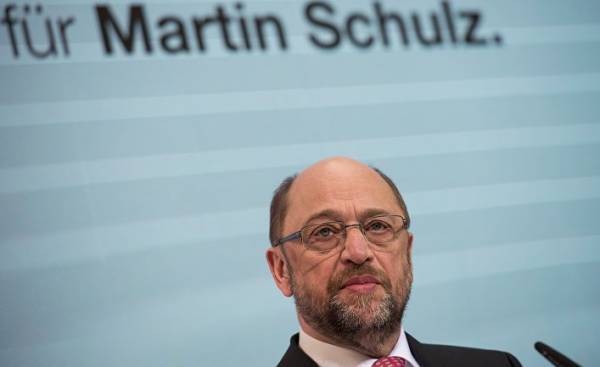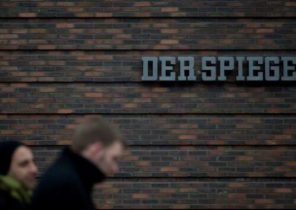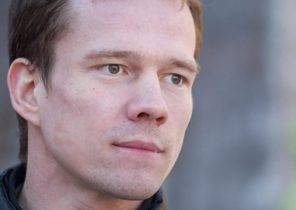
A NEW COURSE? Martin Schulz has drawn renewed attention to the campaign in Germany. Can a former President of the European Parliament to be the one to save the European social democracy?
Germany
In recent years, the social Democrats fail everywhere in Europe. Decades, marked by a right turn, led to the fact that voters now difficult to distinguish the social Democrats from the centre-right parties in country after country, voters are leaving the social Democrats, preferring them right populist parties like the front national in France, the “Party of freedom” in the Netherlands and the “Alternative for Germany” in Germany.
But now to the most important European country, Germany, can happen something significant. Recently nominated as a candidate from the social democratic party SPD for the post of the Federal Chancellor, Martin Schulz, recently sharply criticized the turn to the right, made by his own party, and economic reforms implemented by former Chancellor from the SPD, Gerhard Schroeder.
At a meeting with representatives of trade unions in Westphalia Schulz has promised to do away with many of the reforms of schröder. He said that the social Democrats in Germany made the fatal mistake of succumbing to the neoliberal wave that was rolling over the West in the last decade.
“If Schultz is really going to lead the SPD to the left, it will be good. He does not seem too “left” politics, but it nonetheless can happen,” says expert Cass Mudde (Cas Mudde), specializing in European politics.
It scares Merkel
In September elections in Germany. “All” thought that Angela Merkel has virtually secured a third term as Federal Chancellor. But after Schultz, President of the European Parliament from 2012 to January of this year, quite unexpectedly, was nominated as a candidate in chancellors from the SPD, the social Democrats now won 10% in the opinion polls, which predict today is almost equal to the chances of the SPD and the party of Merkel’s CDU.
The results indicate that left-wing Alliance between the SPD, the left party “Left” and “Green” has long seemed unthinkable, was suddenly quite within reach. But such an Alliance will require that Schultz also broke with the tradition of the SPD to reject cooperation with “Left”.
Inhibits ultra-right-wing
Schroeder project liberalization “Agenda 2010” meant the reduction of social benefits, reduction of state pensions and simplifying dismissal procedures.
Shultz puts reform criticism and says he wants to increase payments to unemployed and retired workers to provide more effective right to participate in decision-making in the workplace, to reduce working hours and provide free childcare for children of employees. He also wants to abandon the practice of concluding temporary contracts — this system is in Germany in the last decade, the real heyday.
Martin Schulz:
• Born December 20, 1955.
• The candidate for the post of Chancellor from the Social democratic party of Germany on the country’s elections in September.
• The mayor of Würselen (Würselen) in 1987 — 1998
• In 1994 he was elected to the European Parliament, where he held a number of positions.
• President of the European Parliament from 2012 until January 2017.
Public opinion polls indicate that the SPD, which acts as a real alternative to the Christian democratic party CDU, simultaneously opposed to right populism.
ADH, whose popularity has long accounted for approximately 15% and is now getting in the polls less than 10%. The SPD’s support with more than 40% in early 2000-ies in recent years has fallen to 20%. Since 2013 SPD is in the government together with the CDU.
The future of the SPD is unclear
The editor of the Frankfurter Allgemeine Zeitung, Jasper von Oldenbockum (Jasper von Altenbockum), believes that Schultz, however, can present a protest of the SPD party, and that he’s using the attacks on the liberal elite and the reforms of the Schroeder — will be able to divert voters from ADG without attacks immigration policy of Merkel.
And the Casa Mode to support Schultz is skeptical.
“Now it is a novelty, about it is much written and said, he does pay a lot of attention,” says Mudge, who believes that positive period quickly can end as soon as German voters know Schultz better.
But isn’t it important that criticism of their own economic reforms, the SPD advocates a candidate of the party itself?
— Yes, but the election campaign has just begun, and I prefer not to speak, wait, what he will say when it will be under pressure, says Mudde.
However, many in the SPD share exhortations Merkel about the economic prudence and a balanced budget. This means that many in the SPD don’t want to part with the reform of the shredder, although the Schultz and is in favour of it now.
“Inside the SPD reigns of great concern, it is unclear to what extent the party can go on like this,” says Mudde.
On his hands there is no blood
After 2008, the SPD supported the economic anti-crisis policy, Merkel, and after the election in 2013 the party is taking part in her government. But not Schultz. Because while other elite of the SPD from Berlin were actively involved in the implementation of economic policies “right”, Schultz was the head of the European Parliament in Brussels.
According to analytical portal of Eurointelligence, which is run by German Wolfgang Munchau (Wolfgang Munchau), which is why Schultz may quite reputable to attack Merkel and to offer an alternative, especially in the area of economic and social policy.
“Couldn’t do no other candidate from the SPD because they all have blood on their hands,” wrote Eurointelligence.
One of these politicians, Sigmar Gabriel, the leader of the SPD in 2009, which, as planned, had to fight with Merkel, but after the disastrous results of public opinion polls, was forced to withdraw his candidacy in favor of Schultz.
Centrist-populist
During the last two election campaigns Merkel led to the win strategy, relying on its role of public activist, respected in the world.
Eurointelligence does not think that this strategy also works well in the case where the opponent will be Schultz, as when she opposed the former leaders of the SPD.
“Schultz is a representative of such a rare race as “centrist-populist”, that’s why he represents such a threat to Merkel,” writes the portal.
The label “centrist-populist” also says that Schultz is more close to the people. Schultz left school because was hoping to become a professional football player, he had a drinking problem, he speaks much more freely than, for example, Merkel.
However, Mudde believes that she has a great chance for another win, if only to use the electoral machine.
“Now people are tired of Angela Merkel, but she’s still incredibly popular, it has been in power for ten years, but it still maintained 70%,” says Casa Mode.







